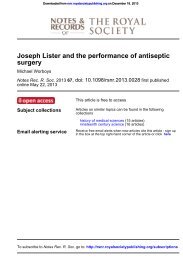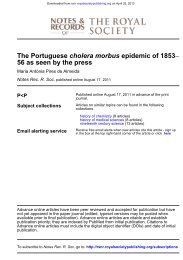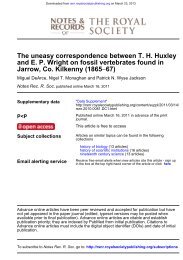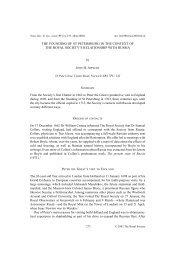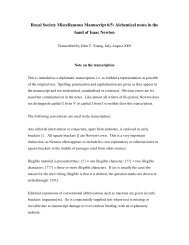an unpublished letter from henry oldenburg to johann heinrich rahn
an unpublished letter from henry oldenburg to johann heinrich rahn
an unpublished letter from henry oldenburg to johann heinrich rahn
You also want an ePaper? Increase the reach of your titles
YUMPU automatically turns print PDFs into web optimized ePapers that Google loves.
Downloaded <strong>from</strong><br />
rsnr.royalsocietypublishing.org on December 6, 2012<br />
258 Noel Malcolm<br />
subject, but that, nevertheless, he has not yet published it, I thought I should mention it <strong>to</strong> you,<br />
in order <strong>to</strong> find out your thoughts about it.<br />
So far as optics are concerned, we are delighted that you have completed a treatise on<br />
optics, dioptrics, <strong>an</strong>d ca<strong>to</strong>ptrics, <strong>to</strong>gether with <strong>an</strong> appendix on practical dioptrics, in which you<br />
show the way (<strong>an</strong>d perhaps the measure), <strong>an</strong>d the necessary <strong>to</strong>ols, for grinding <strong>an</strong>d polishing<br />
[lenses]. 41 We hope that copies of it will soon be delivered <strong>to</strong> us. No doubt you already know<br />
M<strong>an</strong>zini’s Dioptrica, 42 <strong>an</strong>d the Novum problematum opticorum centuria by Eschinardi, 43 published<br />
in Italy; we have recently learned that <strong>an</strong>other work has been published there, the<br />
Dioptrica by de Gottignies, a pupil of Grégoire de Saint-Vincent, <strong>to</strong>gether with a treatise on telescopes<br />
<strong>an</strong>d microscopes. 44 There is also the Synopsis optica of Honoré Fabri, which discusses<br />
the ocular lens consisting of two half-lenses, <strong>to</strong>uching at the centres of their convex sides, <strong>an</strong>d<br />
each having the pl<strong>an</strong>e side facing outwards: this is like the one invented by the most distinguished<br />
Eustachio Divino, but Fabri claims that he was the first <strong>to</strong> demonstrate it. 45 In addition, there is<br />
the eleg<strong>an</strong>t Dioptrique of Father Cherubin, recently published in Fr<strong>an</strong>ce, 46 <strong>to</strong> which Regnauld of<br />
Lyon pays the following tribute: he says that he admires the beauty of this publication, that he<br />
greatly prefers the author’s theory which is set out in it, <strong>an</strong>d that he thinks the Republic of Letters<br />
will be indebted <strong>to</strong> him. 47 Here in London Barrow’s Lectiones dioptricae have been published,<br />
<strong>an</strong>d are much admired. 48 In Denmark Erasmus Bartholinus published a dissertation De chrystallo<br />
isl<strong>an</strong>dico dis-diaclastico, in which he painstakingly explores m<strong>an</strong>y things, <strong>an</strong>d learnedly explains<br />
them. 49 You c<strong>an</strong>not be unaware of the work which your countrym<strong>an</strong> the most learned Joh<strong>an</strong>nes<br />
Ott recently published in Heidelberg, entitled Cogitationes physico-mech<strong>an</strong>icae de natura visionis.<br />
50<br />
Otherwise, the Itali<strong>an</strong>s have published Rossetti’s physico-mathematical treatise; 51<br />
Benedet<strong>to</strong> Castelli’s works, collected in one volume; 52 Bali<strong>an</strong>i’s posthumous minor works; 53<br />
Borelli’s Motiones naturales in gravitate dependentes; 54 Mont<strong>an</strong>ari’s experiments on the rising<br />
of liquids in tubes, <strong>an</strong>d on the glass bubbles which, when their extremities are broken, shatter in<strong>to</strong><br />
extremely small parts; 55 <strong>an</strong>d Mengoli’s works on music. 56 In Fr<strong>an</strong>ce they have published<br />
Blondel’s De resistentia corporum ellipticorum; 57 Milliet de Chales’s edition of Euclid; 58<br />
Mou<strong>to</strong>n’s De mensura diametri solis et lunae; 59 An<strong>to</strong>ine de la Loubère’s polemical Appendices,<br />
against Maign<strong>an</strong>; 60 <strong>an</strong>d Honoré Fabri’s commentaries on Archimedes. 61 And, indeed, in Engl<strong>an</strong>d<br />
we have Dr Wallis’s De motu et libra; his De calculo centri gravitatis; his De regulis motis, vi<br />
percussionis, et hydrostatica; 62 James Gregory’s Exercitationes geometriae; 63 <strong>an</strong>d Nicolaus<br />
Merca<strong>to</strong>r’s Logarithmotechnia. 64 Jeremy Horrox’s work on astronomy, edited by Dr Wallis, is<br />
currently in the press. 65<br />
Since you so c<strong>an</strong>didly offer <strong>to</strong> send details of the optical instruments which you have prepared,<br />
we welcome your generosity, <strong>an</strong>d with the greatest pleasure we promise in return <strong>to</strong> send<br />
you whatever things may serve <strong>to</strong> express our gratitude. The reason why our friend Hooke was<br />
able <strong>to</strong> observe on such a large scale the things he has illustrated in his Micrographia is explained<br />
by him in the preface <strong>to</strong> his book: <strong>an</strong>yone skilled in the English l<strong>an</strong>guage will easily be able <strong>to</strong><br />
tr<strong>an</strong>slate it for you. 66 I should [not] prolong this <strong>letter</strong>—for the excessive prolixity of which I beg<br />
your pardon. Farewell, distinguished Sir, <strong>an</strong>d look kindly on this most devoted admirer of your<br />
teachings <strong>an</strong>d your virtue.<br />
London, 10 June 1671<br />
RAHN’S LETTER TO PELL<br />
Oldenburg did not receive <strong>an</strong>y reply <strong>from</strong> Rahn. An expl<strong>an</strong>ation—at least, <strong>an</strong> ostensible<br />
expl<strong>an</strong>ation—of this fact was supplied four years later, when Rahn at long last wrote<br />
directly <strong>to</strong> his old mathematics tu<strong>to</strong>r, John Pell. The text of his <strong>letter</strong> (figure 2) is as<br />
follows.<br />
À studioso quodam, Algebram, non amplius meam sed multis nominibus tuam, mihi ex munificentia<br />
tua tr<strong>an</strong>smissam accepi, unde colligo, <strong>to</strong>t <strong>an</strong>norum decursu, memoriam mei, adhuc apud te



